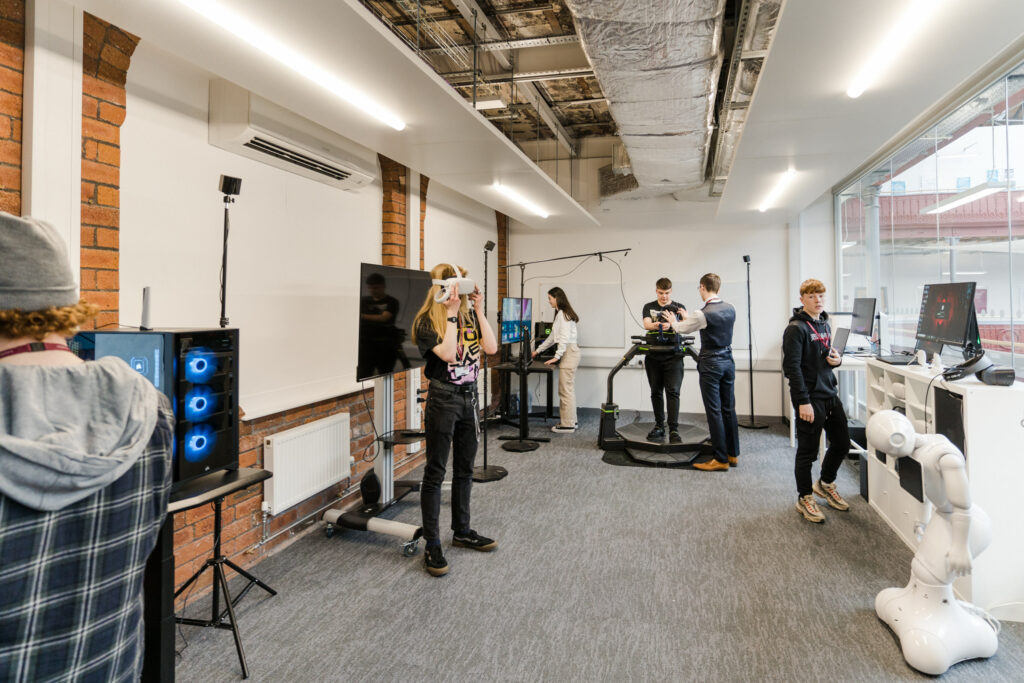
 “I’m determined to become a games programmer one day”, says Bryony Larson (pictured, right), winner of the BTEC Learner of the Year category at the TIGA UK Games Education Awards, as she shares her personal journey into games development and the importance of having more young women in the industry.
“I’m determined to become a games programmer one day”, says Bryony Larson (pictured, right), winner of the BTEC Learner of the Year category at the TIGA UK Games Education Awards, as she shares her personal journey into games development and the importance of having more young women in the industry.
‘A kind of dark magic that only geniuses could harness’ is how Bryony used to describe games development. Little did she know she would be learning the same secrets needed to become a developer a few years later.
It all started when Bryony began playing games at the age of seven, which heightened her curiosity so much she progressed to watching various indie game ‘development logs’ on YouTube. “It seemed so complicated and unfathomable,” she says. “I could never see myself becoming a developer for those reasons.”
By the time she was doing her GCSEs, Bryony began thinking about her career, realising the decision would determine her education for the next two years.
“All I knew was that I wanted to work with computers, preferably doing something creative. Then I realised that even if game development appeared difficult, so what – there was no harm in trying anyway.”
Bryony was delighted to learn that Leeds City College offered a BTEC course specifically for games development, meaning she could specialise in the subject early.
“I was introduced to many different fields of game development in my first year of college, such as concept art, 3D modelling, sound design, programming and working in-engine, using Unity and Unreal Engine 4 and 5,” she says. “Being given the opportunities to experiment with different specialisms and discover which I enjoyed most, was really helpful.”
Bryony initially wanted to specialise in 3D modelling, but ended up gravitating towards programming – the subject she found most difficult.
“I challenged myself to improve and better my understanding of it. After a year of assignments and a group project, where I was the programmer, I finally felt in my element.”
Becoming TIGA BTEC Learner of the Year
BTECs are career-focused qualifications that teach practical skills. The technical nature of BTECs makes them a popular choice in colleges across the UK, as well as with those seeking an alternative to traditional A levels.
“I especially liked how my course enabled me to access the games industry through activities outside of my BTEC,” says Bryony. “Although I’d generally come across TIGA as an organisation and at various game industry events, I heard about the TIGA Game Education Awards through my tutors at Leeds City College”.
The awards recognise outstanding students, education providers and best practice in the wider video games industry. This year’s competition required Bryony to submit a video showreel demonstrating the best work from her first and second years of college.
“I chose pieces I felt demonstrated my technical ability and my passion for programming,” says Bryony. “I also wanted to showcase my experimentation with different areas of game development over my two years of college and my improvement in these areas.”
Bryony’s submission demonstrated her impressive software skills, including 3D models made using Blender, level design using Unreal Engine, narrative writing, plus programming using C# in Unity and blueprints in Unreal Engine.
The awards were live streamed online, with host, CEO of TIGA Dr Richard Wilson OBE, announcing the nominees and winners.
“Hearing I’d won was an unbelievable moment,” says Bryony. “To be recognised by such a reputable organisation in gaming was incredible and a fantastic way to celebrate everything I learnt at college.
“Choosing games development is one of the best decisions I’ve made as it set me on this career path,” says Bryony. “I’m now determined to become a games programmer – BTEC Learner of the Year is just the start!”
No woman should ever be put off from being a developer
Bryony now studies Games Development at the University of Staffordshire and although she’s still one of a few women in her class, she says the support is there.
“When I first started my games development course at college, I couldn’t figure out why there was such a gender imbalance when I had such similar, if not the same career goals, as my male classmates,” she says.
“I now know it’s down to a lack of visibility, which could be off-putting for girls and women worried about being stereotyped.
“Thankfully, there are so many organisations nowadays rectifying this and supporting women to enter the industry. So, if you have a passion and curiosity for making games, don’t let anything deter you.”
For complete novices, Bryony has this advice: “Even if you feel stupid at the beginning or daunted by how much there is to learn, keep going. That’s the only way to get better and you will get better.”
She also recommends regular practice outside of class, following YouTube tutorials and experimenting with software.
“As with any other career path, game development is not just about the stuff you need to learn, but the determination you put into it,” says Bryony. “Anyone can achieve a lot with those things alone. Go for it and good luck!”



